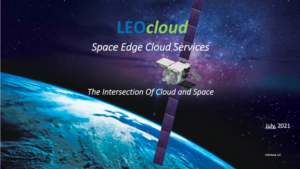“The combination of Ramon.Space’s tremendous space heritage and expertise will provide LEOcloud with the most innovative and resilient roadmap of solutions,” he added.
Ashburn, Virginia-based LEOcloud also has announced deals with Leaf Space and Exodus Orbital since it was founded in February to bring edge computing to space.
Initially, LEOcloud plans to co-locate edge computing services at ground stations operated by partners. Later the firm plans to launch a constellation of data centers, called Space Edge LEO, Gatens told SpaceNews by email.
LEOcloud intends to offer “low latency, highly secure, high availability” cloud services, linking customers on the ground with “satellite data suppliers, hybrid cloud edge computing services and global connectivity” in Phase 1 of its strategy, according to a LEOcloud PowerPoint presentation.
In Phase 2, LEOcloud, “will develop, launch and operate a satellite-based cloud infrastructure providing low latency, secure, high availability, mission-critical cloud services,” according to the presentation.
In June, LEOcloud announced a memorandum of understanding with Toronto-based Exodus Orbital to work on a strategy to “accelerate the development, test and deployment of satellite-hosted applications,” Gatens said in a post on LinkedIn. “Our collaboration will enable a new global app economy in space!”
Leaf Space of Italy announced a memorandum of understanding with LEOcloud in March. Leaf Space and LEOcloud plan to work together to develop a strategy to help customers connect with satellite data suppliers and operate in a hybrid, space-based cloud environment.
“Having access to data from space assets quickly and reliably is absolutely critical to the success of space missions,” Jonata Puglia, Leaf Space co-founder and CEO, said in a statement. Working with LEOcloud will enhance Leaf Space’s ground segment as a service business, he added.
Ramon.Space of Palo Alto, California, announced in May that it raised $17.5 million in a Series A funding round. Investors included StageOne Ventures, Deep Insight, WorldQuant Ventures, UMC Capital and Grove Ventures. With the funds, Ramon.Space said it planned to expand its operations in the United States and Israel as well as its staff working to develop super-computing systems designed to operate in space.



